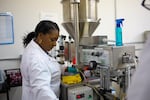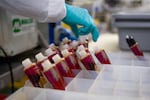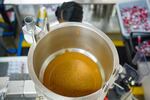Paula Hayes fell in love with makeup as a kid.
“I say from the time that I tried on my mom's lipstick when I was little," she said.

Hue Noir founder, CEO and head chemist Paula Hayes packaging a fresh batch of "Hot Chocolate" foundation at her Beaverton, Oregon lab on May 24, 2019.
Arya Surowidjojo / OPB
When she got to high school, she found the feeling wasn’t mutual. As she began to wear makeup everyday and experiment more with products, she suffered from breakouts and lesions on her skin. She went to a dermatologist, who told her what ingredients were causing the reaction and advised her to avoid those products.
“What I found is that if they didn't cause skin problems for me, they often in my opinion just didn't look right,” Hayes said. “Like the colors weren't right, and I just walked out not feeling confident. But there was this cyclical relationship, because I'd want to go out putting my best face forward.”
Today, Hayes is the founder, CEO and head chemist of Hue Noir, a makeup manufacturer and distributor with products designed for women of color.
Her personal setbacks with makeup set her up for a career focused on making the beauty industry more inclusive. But the path to get there wasn’t a straight line.
For example: Hayes went to college planning to become a dermatologist.
“I initially thought if I want to specialize in something that goes on the skin, I'm going to have to become a doctor,” she said. “No one really explained the other possibilities for me.”
A simple question in chemistry class at Lewis & Clark College changed her trajectory. Her professor asked the class what else they wanted to make. “And I lifted up literally my lipstick tube and said, 'How do you make this?’” Hayes recalled.
Classmates rolled their eyes, she said, but she didn’t let that discourage her.
“By then I knew enough to know that chemistry, that stuff we were doing, created tangible products,” she said. “So I was going to start to figure it out.”
Starting With Science
She’s always been a tinkerer. As a kid, she liked to mix things and figure out the “why” behind it all.
“I distinctly remember a period in elementary school going into middle school where a friend of mine had mentioned something about science,” she said. “The group of girls that I hung out with all said, ‘Oh, that's nerdy.’ And I said, ‘Yeah, that's nerdy.’
“Then all of a sudden I get to high school, and I just fell in love with it. So I decided, ‘Well, I guess I can't call it nerdy anymore.’"
After college, and that transformative moment in chemistry class, she returned home to Los Angeles. She looked for jobs in the makeup industry, but at the time manufacturers were concentrated in New Jersey. The idea of moving across the country without a job or even a lead was too daunting.
Hayes said her father always encouraged her to do what she loved. He sat her down one day and said, “Listen, the people who are most successful are open to opportunities, so don't box yourself in,” she recalled. “Just explore, see what's out there.”
She started interning at a food and beverage company and eventually landed a job as a lab assistant. Hayes said she didn’t see the connection between beauty and food and beverage, but her boss assured her she was on the right path.
He told her that if she succeeded in the food industry, “there won't be anything that you can't make. You'll know all the ingredients,’” she said.
She worked her way up to become a reverse engineer. Clients would bring her a product — say, a can of soup — and she worked backwards to recreate the formula based on the ingredient list. She took those skills and started working on her passion project in her free time.
“I bought these little molds, and I bought these little ingredients, and I started mixing the kind of color that I wanted,” she said. “... I remember pouring it for the very first time in my kitchen and pulling it out and having it in the tube and saying, ‘Oh my God, I made a lipstick.”

Freshly packaged Hue Noir "Hot Chocolate" foundation in Beaverton, Oregon on May 24, 2019.
Arya Surowidjojo / OPB
After hosting makeup events with girlfriends in her living room, she began receiving invitations to trade shows. This was around 2009, and for the first six years or so, people didn’t seem to understand her mission. Why would women of color need a makeup line designed specifically for them?
She said she had to educate people about the lack of options across the industry, telling people who asked to go look at their favorite beauty counter: “If you really go and take a look," she said, "you find that there aren't a whole lot of options to choose from.”
In recent years the conversation has shifted. Music star Rihanna played a big role in the change.
In September 2017, she launched a cosmetics line, Fenty Beauty. It featured celebrity backing and offered 50 different shades of foundation. The makeup flew off the shelves and was back ordered for months.
“Fenty was game changing in many ways, and the power of Rihanna and her ability to marshal that for selling products was tremendous,” said Liz Dunn, a former retail analyst and founder of ProForma Inc., a data and analytics company. “I think it had a lot to do with where we are in the beauty business right now and how the consumer is interacting with brands.”
The beauty industry is growing faster than overall consumer spending, with global sales in the billions, Dunn said.
And social media has altered how customers find their favorite products. Gone are the days when major companies and models in glossy magazine ads ruled the makeup world. Consumers now interact with brands like never before — whether it’s to compliment a new eye shadow palette or call out a change in formula. YouTube and Instagram have extended the reach of beauty bloggers to a broader audience with step-by-step videos on how to create the perfect lip or brow.
“We’re operating at a time when inclusivity is sort of table stakes for any brand, and consumers are looking for smaller brands,” Dunn said. “They’re out there looking for things that are inclusive and tailored to them.”
Dunn said there have always been a handful of companies targeting women of color, but they weren’t getting the recognition and certainly not the distribution opportunities that brands are today.
Hue Noir is 10 now and based in Oregon. Hayes’ husband’s job brought her back. Hayes runs a lean operation with only about half a dozen people on her full-time staff. All the company's products are produced at the Beaverton headquarters, which she says ensures consistency. The products are sold in identical packing with a simple sticker to differentiate them. This, she said, keeps prices down.

Bird's-eye-view of a fresh batch of "Hot Chocolate" foundation before packaging. Beaverton, Oregon-based Hue Noir creates makeup products catered to women of color.
Arya Surowidjojo / OPB
The company’s foundations, lipsticks, eyeshadows and glosses are on the shelves of hundreds of retailers across the country including Sally Beauty, Target and specialty beauty boutiques. They’re also sold online at Costco, Amazon and Hue Noir’s own site.
“The first time I heard one woman tell me that my product was a game changer for her, I almost cried,” Hayes said. "I definitely started to tear up."
Now Hayes hears that all the time. She considers Hue Noir a luxury brand at an affordable price point — she said that means her cosmetics contains the same ingredients as higher-priced brands.
“That’s immeasurable because it again goes back to me fulfilling the promise that I made to do something and do it authentically,” Hayes said.
In the little bit of free time she has, she tries to encourage young women to find their passion in science and let them know all the opportunities that are available in STEM fields, something she didn’t realize until college.
Hayes also gets approached by others asking for her help create their own products. She says she’s toying with the idea of creating "Hue Labs" as a means of helping others bring their products to fruition.
“That would be a full circle moment when I really think about my career," Hayes said, “and then starting to figure out what's next.”
This story is part of Sharing America Profiles — a series about women of color doing local work that highlights an issue of national importance. Erica Morrison is part of the public-radio collaborative Sharing America, covering the intersection of race, identity and culture.
This initiative, funded by the Corporation for Public Broadcasting, includes reporters in Hartford, St. Louis, Kansas City, and Portland, Oregon. Follow Erica @EwMorrison.

Sharing America: A Public Radio Collaboration
Erica Morrison is part of the public radio collaborative “Sharing America,” covering the intersection of race, identity and culture. This new initiative, funded by the Corporation for Public Broadcasting, includes reporters in the Northwest and Hartford, Connecticut, St. Louis and Kansas City. You can find more "Sharing America" coverage here.
